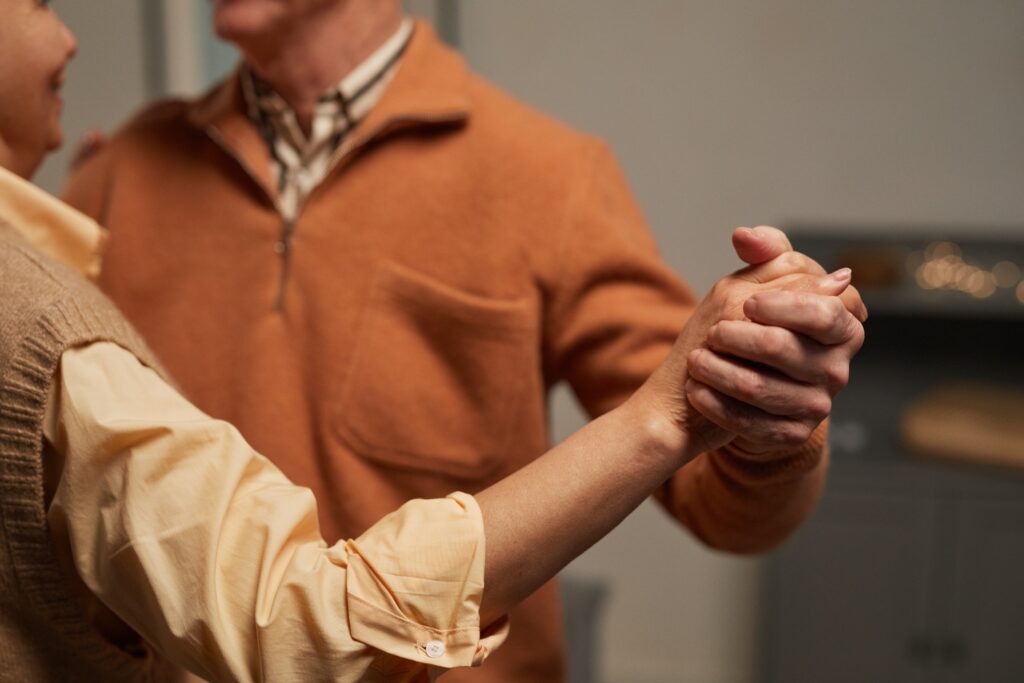5 Health Benefits of Dancing for Dementia Patients and Their Caregivers

While dementia impacts the daily functioning of milions people all over the world, physical and mental activities shine as a beacon of hope for individuals with the diagnosis. Several studies confirm that exercising can boost the quality of patients’ lives, and dancing in particular gained recognition. Dancing possesses numerous health benefits for people suffering from a condition that does not have a cure. It is known to release stress hormones, improve cognitive stimulation, train memory, and provide an overall better physical and emotional well-being. Therefore, in this article you can dive into 5 scientifically supported health benefits of dancing. We’ll discuss how individuals with dementia as well as their caregivers can benefit from this captivating and relaxing form of exercise.
Top 5 Health Benefits of Dancing
Exercise has been proven to be a valuable tool to boost dementia patients’ well-being. Therefore, dancing is indeed a beneficial option for individuals with dementia as well as their caregivers as it’s not only a fun way to move but also includes perks, such as stress release, mood boost, and much more. Among all the benefits, we compiled a list of the top 5 health benefits of dancing for both – dementia patients and their caregivers:
1. Cognitive Stimulation and Memory Training
2. Better Physical Health and Mobility
3. Emotional Well-being and Mood Elevation
4. Stress Reduction and Relaxation
5. Social Interaction and Communication
While many of the benefits may seem evident, we’ll explore each of them to understand how dancing can enhance the quality of life for both dementia patients and their caregivers.
Cognitive Stimulation and Memory Enhancement

Dancing is a powerful tool for cognitive stimulation. It immediately ticks off three boxes that have been proven to help individuals with dementia: physical exercise, social interaction, and mental engagement. Research proves it even further. A study published in the New England Journal of Medicine showed that regular dancing leads to cognitive function improvements among individuals with dementia. Dancing trains and engages various parts of the brain, especially those responsible for memory and retrieval. Therefore, encouraging a person with dementia to move their body regularly can slow down the dementia-related cognitive decline.
Improved Physical Health and Mobility

Dancing doesn’t focus on a particular muscle or body part, that’s why it’s a universal exercise for individuals with dementia. It’s a rhythmic activity that enhances cardiovascular endurance,
flexibility, and muscular strength which is important to people with dementia as well as their caregivers. Engaging in regular dance sessions not only benefits individuals with dementia but also helps caregivers who can experience physical strain due to the difficult demands of caregiving. Hence, while dancing alongside their loved ones, caregivers can also improve their balance, coordination, and muscle strength.
Simultaneously, caregivers maintain their own physical well-being, reducing the risk of injury and promoting overall health. Furthermore, dancing together creates a shared experience. It can help caregivers deepen the bond with their patients, and help create an enjoyable activity for both.
Emotional Well-being and Mood Elevation
Dementia can often provoke frustration, anxiety, and depression in both – patients and their caregivers. Usually individuals with dementia may experience memory loss and difficulty with daily tasks that can easily lead to feelings of helplessness and overwhelm. However, dancing provides a transformative escape from these negative emotions. According to research published in the Journal of Aging and Physical Activity, dance therapy reduces symptoms of depression and increases happiness and enjoyment among individuals with dementia. In addition to that, dancing in a group also fosters social connections and a sense of belonging which can positively impact a patient’s well-being.
Stress Reduction and Relaxation
Caring for individuals with dementia can present emotional and physical challenges, often resulting in higher stress levels frustration, and anxiety. Consequently, it affects the individual with dementia. However, while relaxation techniques like meditation can be beneficial for finding inner peace, they may not always be feasible due to time constraints or the caregiving environment. In such situations, dancing can offer a delightful way to reduce stress. What makes it even more valuable is that it can be enjoyed within the comfort of one’s home and can involve the individual with dementia being cared for. We already discussed that dancing reduces depressive symptoms and British Science Association proves it further. According to the association, dancing has can effectively reduce levels of cortisol, known as the stress hormone. On top of that, dancing releases dopamine, a natural mood booster, and endorphins – natural painkillers. These biochemical responses demonstrate that dancing not only benefits individuals with dementia but can also elevate caregiver’s mood and encourage the production of happy hormones.
Social Integration and Communication

Dementia can definitely make socializing and communicating difficult. However, besides numerous health benefits, dancing also taps into the social aspect of the diagnosis – it helps individuals with dementia to feel included and connected to others. Research on social dancing has shown that dance classes improve social interaction, capabilities, and communication skills among individuals with dementia. While dancing, patients can engage with others via partner dances. For example, learning group choreography fosters a sense of togetherness, and patients have the opportunity to express themselves in the presence of like-minded personalities. All this said, dancing becomes a powerful space for social engagement, breaking through the isolation often associated with dementia, and opening doors to a world of shared experiences and belonging.
Wrapping up
Dancing offers many health benefits for both dementia patients and their caregivers that also positively affect their social life. Scientific studies confirmed that dancing exercises provide cognitive stimulation and memory training, improves physical health and mobility, improves emotional well-being and mood, reduces stress, and fosters social integration. Overall, dancing holds great potential in enhancing the quality of life for dementia patients and their caregivers alike.


great article thank for sharing